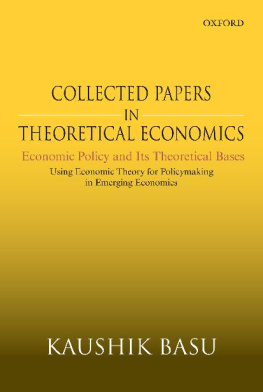
ROBUST
MECHANISM
DESIGN
The Role of Private Information
and Higher Order Beliefs
World Scientific Series in Economic Theory
(ISSN: 2251-2071)
Series Editor: Eric Maskin (Harvard University, USA)
| Published |
| Vol. 1 | Equality of Opportunity: The Economics of Responsibility by Marc Fleurbaey and Franois Maniquet |
| Vol. 2 | Robust Mechanism Design: The Role of Private Information and Higher Order Beliefs Dirk Bergemann and Stephen Morris |
World Scientific Series in Economic Theory - Vol. 2
ROBUST
MECHANISM
DESIGN
The Role of Private Information
and Higher Order Beliefs
Dirk Bergemann
Yale University, USA
Stephen Morris
Princeton University, USA

Published by
World Scientific Publishing Co. Pte. Ltd.
5 Toh Tuck Link, Singapore 596224
USA office: 27 Warren Street, Suite 401-402, Hackensack, NJ 07601
UK office: 57 Shelton Street, Covent Garden, London WC2H 9HE
Library of Congress Cataloging-in-Publication Data
Bergemann, Dirk.
Robust mechanism design : the role of private information and higher order beliefs / by
Dirk Bergemann & Stephen Morris. -- 1st ed.
p. cm. -- (World scientific series in economic theory ; 2)
Includes bibliographical references and index.
ISBN-13: 978-9814374583
ISBN-10: 981437458X
1. Robust control. 2. Prices. I. Morris, Stephen. II. Title.
TJ217.2.B47 2012
629.8312--dc23
2012005125
British Library Cataloguing-in-Publication Data
A catalogue record for this book is available from the British Library.
Copyright 2012 by World Scientific Publishing Co. Pte. Ltd.
All rights reserved. This book, or parts thereof, may not be reproduced in any form or by any means, electronic or mechanical, including photocopying, recording or any information storage and retrieval system now known or to be invented, without written permission from the Publisher.
For photocopying of material in this volume, please pay a copying fee through the Copyright Clearance Center, Inc., 222 Rosewood Drive, Danvers, MA 01923, USA. In this case permission to photocopy is not required from the publisher.
In-house Editor: Alisha Nguyen
Typeset by Stallion Press
Email:
Printed in Singapore.
To our wives, Kishwar and Violeta, who gave us steadfast love and support in the decade we wrote the papers in this book, and to our children, Reza and Yasmin, and Luis, Thomas and Edward whose inspiring first decade it was.
Equilibrium robustness in informational variables is critical, if one wants to use results from the mechanism design literature in real life applications. The papers included in the Bergemann and Morris book describe state of the art progress in this direction of research. The book is an excellent resource for established game theorists, who want to learn more about this subject; and for PhD students, who look for exciting problems to investigate.
Ehud Kalai
Kellogg School of Management, Northwestern University
The question of the design of institutions has been at the centre of some of the most important economic theory in the past four decades. Bergemann and Morris have made seminal contributions to the understanding of how uncertainty can and should be incorporated into mechanism design, and this volume reproduces a collection of their most important work in the area. The volume will be an important reference for those working in the area and those who wish to apply the ideas in economic models.
Andrew Postlewaite
Department of Economics, University of Pennsylvania
Foreword
Good social, political, and economic decisions are normally contingent on the preferences of individuals in society over the possible options. Indeed, the very concept of economic efficiency (Pareto optimality) demands preference contingency: an option is efficient provided there is no other option that everyone prefers. Yet, unfortunately for public decision-makers, individuals preferences are not typically publicly known, a limitation that can seriously interfere with making the right choice.
A great accomplishment of mechanism design theory has been to show that, in many cases, this limitation can be circumvented. That is, it is often possible in principle to devise a mechanism or game whose outcome in equilibrium is the same as the one that would have been chosen had preferences been public in the first place.
Even so, a good many of the mechanisms exhibited in the literature have been justifiably criticized for depending too sensitively on details that the mechanism designer or the individuals themselves are not likely to know, at least not very precisely. For example, although the literature on Bayesian mechanism design arose to handle the case where individuals do not know one anothers preferences, much of it requires that they and the mechanism designer have common knowledge of the prior probability distribution from which these preferences are drawn. This implies, in particular, that if individual A somehow learns Bs preferences, then he will also know what B beliefs about As preferences are an implication that, in practice, is often implausible.
Dirk Bergemann and Stephen Morris have made a major contribution to mechanism design by developing the idea that, when constructing a mechanism, we should carefully model an individuals type space: not only his possible preferences, but also his possible beliefs (about others preferences, about others beliefs about his preferences, etc.). Furthermore, we should ordinarily take this type space to be larger (allowing for a greater variety of beliefs) than is conventionally assumed. By doing so, we make the mechanism more robust than those of the standard literature.
I am delighted that this volume in the Economic Theory series gathers twelve important papers that Bergemann and Morris have written with each other and with other authors on robust mechanism design. The volume also provides a detailed and beautifully lucid introduction to their work through the particular example of how to allocate a single indivisible good.
Eric Maskin
Editor-in-Chief
World Scientific Series in Economic Theory
Acknowledgments
We would like to thank Eric Maskin, for inviting us to present the material in this series edited by him, for valuable conversations about the material and lastly for the role that his work on efficient auctions, Maskin (1992) and Dasgupta and Maskin (2000), played in the development of the present work. We would also like to thank co-authors Hanming Fang, Takahashi Kunimoto, Moritz Meyer-ter-Vehn, Karl Schlag and Olivier Tercieux for agreeing to have their joint work with us included in this volume and Andreas Blume, Tilman Brgers, Jacques Cremer, Moritz Meyer-ter-Vehn, Andy Postlewaite, Phil Reny and Olivier Tercieux for comments on this introduction. We had the opportunity to present the material in this introduction at a number of invited lectures, notably at Boston University, Northwestern University and the European and North American Econometric Society Meetings and a set of slides which cover and accompany this introduction can be found at http://dirkbergemann.commons.yale.edu/files/2010/12/robustmechanism design1.pdf.
Contents
Robust Mechanism Design: An Introduction
Next page












